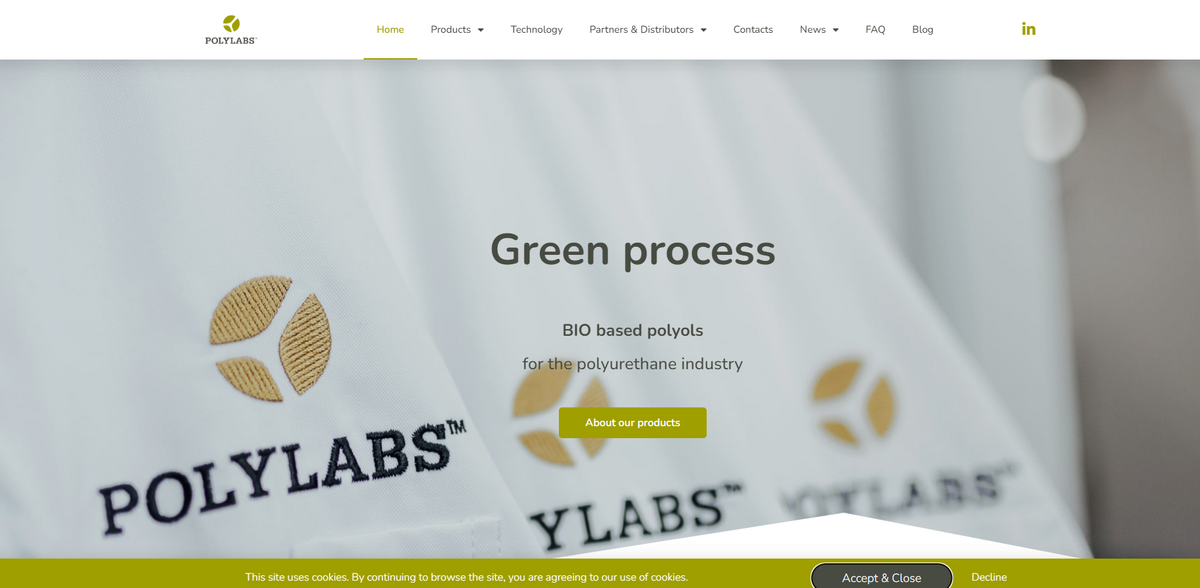What the Project Is
BIO BASED POLYOLS FOR THE POLYURETHANE INDUSTRY is at the forefront of sustainable chemical innovation. Polylabs produces and sells bio polyol – a key raw material for the polyurethane industry – using natural oils like canola or tall oil. This material replaces fossil based chemicals in polyurethane formulations, not only for the polyurethane industry itself but also for construction, shipbuilding, automotive, home appliances, and even aerospace. Imagine an aeroplane, like the one Picards built with polyurethanes derived from crude oil – with this innovation, that same aeroplane could be more environmentally friendly, partially bio based, and would not cost more… It delivers exceptional performance and does so with up to 83% bio carbon content while being CO2 negative. Staffed by a team that values innovative production methods and the importance of environmental responsibility, this project signals a decisive move from fossil fuels to renewable materials.
Main Benefit
The project stands out by offering benefits that appeal to modern industries striving for sustainability without compromising on quality or price. Key advantages include:
- COMPETITIVE PRICE: Bio polyols are available at the same price levels as fossil-based polyols.
- RENEWABLE SOURCE: Production uses recycled natural oils and side stream products from the forest industry.
- COMPATIBILITY: The bio polyols offer good compatibility with other polyols, blowing agents, isocyanate, and especially pentanes.
- LOW CO2 FOOTPRINT: Compared to fossil-based alternatives, these bio polyols have a significantly lower CO2 footprint.
- GREEN PROCESS: Their production does not create VOCs or noxious by-products, ensuring a greener process overall.
- NEW OPPORTUNITIES: They enable upgrades in existing polyurethane products with increased renewable bio carbon content, potentially opening doors for new green product lines.
Sustainability Commitment
At the heart of this initiative lies an unyielding commitment to environmental responsibility. The project is driven by the belief in the benefits of eco-friendly production methods, empowering customers to reduce their carbon footprint. Every step, from the selection of raw materials to the production process, is designed to favor sustainability. By replacing fossil based chemicals with bio based alternatives, the project fills an essential gap in the market. The commitment is evident through ISO 9001:2015 certification, ensuring the highest standards of process management quality are met. This dedication not only addresses immediate needs but also nurtures a thriving, eco-conscious future – a future where industries can innovate without sacrificing the planet.
Lifecycle Analysis
The environmental impact of production is meticulously quantified through Cradle-to-Gate analysis. This model starts with the extraction of raw materials – the cradle – and ends when the product leaves the manufacturing facility – the gate. It includes:
- Raw Material Footprint: Emissions resulting from sourcing and producing the raw materials.
- Transportation Footprint: Emissions linked to transporting raw materials to the production site.
- Production Footprint: Emissions arising from the actual manufacturing processes.
Cradle-to-Gate calculations offer a focused view on the manufacturing process’s environmental impact and are much easier to calculate and verify than full lifecycle assessments such as Cradle-to-Grave or Cradle-to-Cradle. It is a clear demonstration of how a manufacturing process can blend efficiency with sustainability.
Technical Excellence
The technical prowess behind these bio polyols is as impressive as their environmental credentials. Crafted with meticulous care and meeting the highest standards, the production process benefits from an innovative method that makes this award-winning material remarkably competitive. Compared to traditional fossil-based raw materials, the bio polyols offer not only technical advantages in formulation but also improvements in overall product performance. Almost every industry – from construction to aerospace – stands to gain from using a material that is more environmentally friendly. It might even sound a little revolutionary: replacing conventional, crude oil-based inputs with a clean, cutting-edge alternative that is competitive in price and performance.
Project Impact
- SDG 9: Industry, Innovation and Infrastructure
- SDG 12: Responsible Consumption and Production
- SDG 13: Climate Action
- SDG 15: Life on Land
Future Opportunities
Looking forward, the adoption of bio-based polyols represents more than just a shift in raw materials – it marks the beginning of new business opportunities and a transformative change in product lines. In industries that have traditionally relied on fossil-based materials, there now exists a potential for upgrading formulations and advancing toward a more sustainable blueprint. The innovative production process not only meets current market demands but also sets the stage for future advancements. With the possibility of further technical improvements and broader market adoption, the project is poised to reshape industries, encouraging a move towards greener practices across construction, shipbuilding, automotive, home appliances, aerospace, and beyond. There is a sense of momentum and potential – a promise of an eco-conscious future where quality, economy, and sustainability flourish together…


















